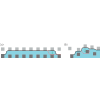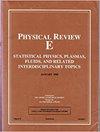Contact angle hysteresis on nonwetting microstructured surfaces: Effect of randomly distributed pillars or holes
IF 2.4
3区 物理与天体物理
Q1 Mathematics
引用次数: 0
Abstract
We present a numerical study of the advancing and receding apparent contact angles for a liquid meniscus in contact with an ultrahydrophobic surface with randomly distributed microsized pillars or holes in the Cassie's wetting regime. We study the Wilhelmy plate system in the framework of the full capillary model to obtain these angles using the heterogeneous surface approximation model for a broad interval of values of pillar or hole concentration and for both square and circular shapes of the pillars or holes cross-section. Three types of random placing of defects on the plate are investigated, i.e., two with restrictions: (1) with maximum and (2) with minimum distance between the defects (in these cases the defects are isolated), and (3) without restrictions (the defects can overlap). The results show that the type of defect distribution and also the type of the defects shape (circular or square) does not affect the magnitude of the two angles. The results of the numerical simulations showed that the retention force for a plate with randomly located defects is not greater, and for larger concentrations of pillars or holes, it is smaller than that for periodically spaced ones. Comparisons with experimental results for the receding contact angle on surfaces with pillars and with the advancing contact angle on surfaces with periodically arranged holes is carried out.

非润湿微结构表面上的接触角滞后:随机分布的柱或孔的影响
我们介绍了在卡西湿润机制下,液体半月板与随机分布的微小液柱或液孔的超疏水表面接触时,前进和后退视接触角的数值研究。我们在全毛细管模型的框架下研究了 Wilhelmy 板系统,利用异质表面近似模型,在柱或孔浓度值的宽区间内,以及在柱或孔横截面的方形和圆形形状下,获得了这些角度。研究了在板上随机放置缺陷的三种类型,即两种有限制的类型:(1) 缺陷间距最大和 (2) 缺陷间距最小(在这种情况下,缺陷是孤立的);(3) 无限制(缺陷可以重叠)。结果表明,缺陷分布类型和缺陷形状类型(圆形或方形)并不影响两个角度的大小。数值模拟的结果表明,随机分布缺陷的板材的保持力并不大,而对于较大集中的柱或孔,保持力要小于周期性分布的柱或孔。与实验结果进行了比较,得出了带有柱子的表面上的后退接触角和带有周期性排列孔的表面上的前进接触角。
本文章由计算机程序翻译,如有差异,请以英文原文为准。
求助全文
约1分钟内获得全文
求助全文
来源期刊

Physical review. E
物理-物理:流体与等离子体
CiteScore
4.60
自引率
16.70%
发文量
0
审稿时长
3.3 months
期刊介绍:
Physical Review E (PRE), broad and interdisciplinary in scope, focuses on collective phenomena of many-body systems, with statistical physics and nonlinear dynamics as the central themes of the journal. Physical Review E publishes recent developments in biological and soft matter physics including granular materials, colloids, complex fluids, liquid crystals, and polymers. The journal covers fluid dynamics and plasma physics and includes sections on computational and interdisciplinary physics, for example, complex networks.
 求助内容:
求助内容: 应助结果提醒方式:
应助结果提醒方式:


